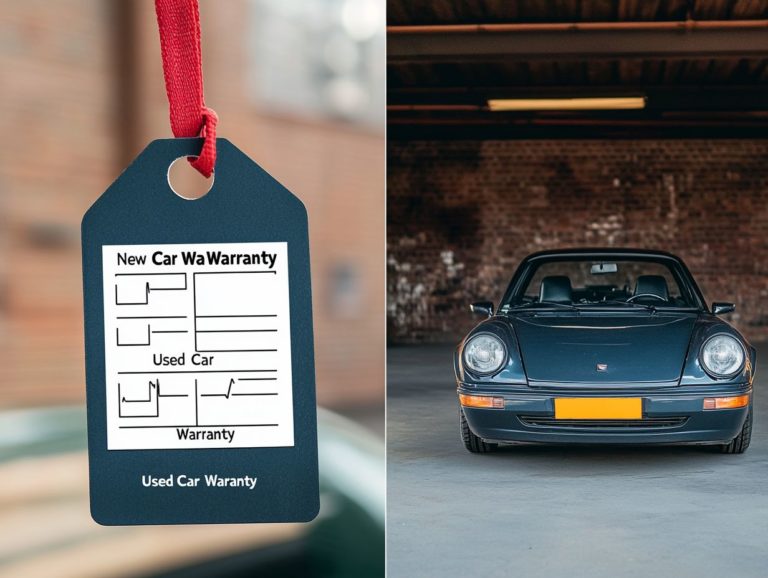How to File a Car Warranty Claim Successfully
Navigating the realm of car warranties can feel overwhelming, but grasping the essentials can save you both time and money. Let s dive into the world of car warranties and uncover what you need to know!
This article will unravel what a car warranty truly is, delve into the various types available, and guide you on when and how to file a claim. Whether you spot signs that your car might need repairs or simply wish to ensure you have coverage, you’ll discover valuable tips for a successful warranty claim process.
So, buckle up and let s explore the details together!
Contents
- Key Takeaways:
- Understanding Car Warranties
- When to File a Car Warranty Claim
- Steps to File a Car Warranty Claim
- Tips for a Successful Car Warranty Claim
- Frequently Asked Questions
- Why should you file a car warranty claim, and how does it benefit you?
- What should I do before filing a car warranty claim?
- Can I file a car warranty claim if my vehicle is no longer under warranty?
- What is the process for filing a car warranty claim?
- What should I do if my car warranty claim is denied?
- How can I increase my chances of successfully filing a car warranty claim?
Key Takeaways:

- Understand the basics of car warranties and the types available to ensure you have the right coverage for your vehicle.
- Know the signs that your car needs repairs and whether you are eligible for warranty coverage to avoid claims being denied.
- Have all necessary documentation and be prepared to negotiate with your warranty provider to increase the success of your claim.
Understanding Car Warranties
Understanding car warranties is essential for you as a vehicle owner, offering vital financial protection and peace of mind against unexpected repair costs. Think of a car warranty as a contract between you and the warranty provider, detailing the coverage terms what repairs are included, how long the warranty lasts, and any specific conditions you must adhere to, like routine check-ups and proper documentation.
By comprehending the intricate details of warranty management, you can skillfully navigate the claims process, ensuring you make the most of your warranty benefits while enjoying a positive experience with your dealership.
What is a Car Warranty?
A car warranty is a legally binding agreement that offers you financial support for repairs and maintenance of your vehicle, specifically addressing certain mechanical and electrical failures that may arise during its operational lifespan.
Understanding the various types of warranties such as manufacturer, extended, and powertrain options is crucial for you. Each type comes with its own scope of coverage and limitations. For example, a powertrain warranty typically covers the most essential components like the engine and transmission, while an extended warranty may offer broader protection that also includes additional electronic systems.
It s vital for you to grasp the specifics of your warranty claims process and the dealership policies associated with it. This knowledge gives you the power to mitigate costs and ensures that you’re well-prepared should mechanical failures occur, significantly enhancing your overall ownership experience.
Types of Car Warranties
In the automotive industry, you ll encounter various types of car warranties, including factory warranties, extended warranties, and powertrain warranties. Each type offers distinct levels of coverage and protection tailored to your needs.
Factory warranties are typically standard with new vehicles, lasting around three to five years and covering defects in materials and workmanship. If you want extra peace of mind, consider extended warranties, which provide additional protection beyond the factory warranty and can often extend up to ten years or more, depending on the plan you choose. Powertrain warranties, meanwhile, focus on essential components like the engine and transmission, ensuring that the heart of your vehicle remains dependable.
Grasping these distinctions not only gives you the power to make informed choices but also enhances dealership operations. By offering tailored service solutions that align with your expectations, dealerships can provide a more satisfying and personalized experience.
When to File a Car Warranty Claim
Understanding the optimal moments to file a car warranty claim is crucial for preserving your vehicle’s performance and ensuring your satisfaction as a customer. This becomes especially important when you encounter issues that may be covered by your warranty, such as mechanical failures or defects that manifest within the specified warranty period.
Signs that Your Car Needs Repairs

Spotting signs that your car needs repairs is crucial. It helps prevent bigger issues and ensures your warranty claims are handled quickly.
Regularly monitoring for unusual noises, like grinding or squealing sounds from the brakes or engine, can serve as early warnings of problems. Unexpected warning lights on your dashboard might point to issues that need immediate attention. Noticeable drops in performance such as engine stalling or poor acceleration are also critical factors to keep an eye on.
Staying on top of regular vehicle inspections not only extends your car’s lifespan but also helps maintain detailed service records. These records can be invaluable when filing warranty claims and ensuring your repairs are covered.
Eligibility for Warranty Coverage
Eligibility for warranty coverage can differ based on several factors, including the type of warranty you choose, your vehicle s age, mileage, and your adherence to recommended maintenance schedules.
Understanding these criteria is vital for you as a vehicle owner. They underscore the importance of following specific guidelines to ensure your claims are processed smoothly. Remember that exclusions related to aftermarket modifications (changes made to your car after purchase that weren’t part of the original design) or neglecting service intervals could jeopardize your coverage.
Maintaining thorough documentation of all your vehicle maintenance activities is essential. This serves as proof for verifying your eligibility.
Reach out to customer service representatives now! They can help you understand any uncertainties regarding warranty terms.
Steps to File a Car Warranty Claim
Filing a car warranty claim involves a careful process that requires thorough documentation and clear communication with your warranty provider. For detailed guidance, check out understanding the warranty claims process, which ensures your repairs are adequately covered under the terms of your warranty.
Gather Necessary Documentation
Gathering the necessary documentation is a key step in the warranty claims process. It equips the claims department with vital information to evaluate and approve your claim efficiently.
To ensure a seamless experience, prepare key documents such as:
- Repair orders that detail the work performed
- Comprehensive maintenance records showcasing regular upkeep
- Any previous correspondence with the warranty provider
These documents substantiate your claim and create a clear timeline of care and service history. By keeping accurate and organized records, you can significantly streamline the process, minimizing the chances of delays or complications. This ultimately enhances your likelihood of a favorable outcome.
Contacting the Warranty Provider
Once you ve gathered all the necessary documentation, the next step is to reach out to your warranty provider to begin the claims submission. You can typically do this through their customer service channels.
Prepare for this conversation by having your warranty number, purchase receipts, and any supporting evidence of the product issue ready. Depending on your preference, you can contact them via phone, email, or an online chat feature. Each method might provide different levels of support, so choose the one that feels most comfortable.
During your call or message, clearly articulate the problem, referencing your documentation to strengthen your case. This clarity not only speeds up the process but also reduces misunderstandings, paving the way for a smoother approval of your claim.
Tips for a Successful Car Warranty Claim

To successfully navigate the intricacies of filing a car warranty claim, you must be both well-prepared and persistent. By doing so, you significantly enhance your chances of receiving approval from the warranty provider and securing the necessary repairs, especially when you understand the claims process for car warranties.
Being Prepared and Persistent
Being prepared and persistent is crucial for a successful warranty claim.
This method helps you navigate the claims process with both effectiveness and efficiency.
Staying organized is essential. Keep detailed records of all communications, noting the dates and times of your discussions with customer service representatives.
Adopting a proactive stance is equally important. Regularly follow up with warranty support to check the status of your claim. This diligence can lead to timely approvals and swift resolutions to any potential issues.
By taking these steps, you demonstrate your commitment to the process and reinforce your status as a valued customer, often resulting in a much smoother experience overall.
Negotiating with the Warranty Provider
Negotiating with your warranty provider is a vital step in the claims process. This is especially true if you encounter challenges or disagreements that could impact customer satisfaction.
Understanding the specifics of your warranty, including its terms and conditions, is essential. Gather all relevant documentation and evidence to bolster your case, such as repair records or photos illustrating the issue.
Being aware of your rights under warranty laws, which are rules that protect your rights regarding warranty claims, can empower you during discussions. If initial negotiations don’t yield the desired outcome, exploring the appeals process may be necessary. This gives you another opportunity to assert your claim.
Throughout this journey, maintaining a calm and professional demeanor is crucial. This strategy helps create engaging discussions that drive results and can lead to a favorable resolution.
Frequently Asked Questions
Why should you file a car warranty claim, and how does it benefit you?
A car warranty claim asks for repairs on parts covered by the warranty. Filing a claim successfully ensures that the cost of necessary repairs or replacements is covered, saving you from expensive out-of-pocket expenses.
What should I do before filing a car warranty claim?

Before filing a car warranty claim, review the terms and conditions of your warranty to ensure that the issue you’re experiencing is covered. It’s also helpful to know how to keep track of your car warranty. Gather any necessary documentation, such as your warranty paperwork, vehicle maintenance records, and pictures of the issue.
Can I file a car warranty claim if my vehicle is no longer under warranty?
No, you can only file a car warranty claim while your vehicle is covered under the manufacturer’s warranty. If your warranty has expired, you’ll need to cover the cost of repairs or replacements yourself.
What is the process for filing a car warranty claim?
The process may vary depending on the manufacturer, but generally, contact the dealership or manufacturer’s customer service department to report the issue. They will provide you with instructions on how to proceed, which may include bringing your vehicle to an authorized repair shop for evaluation.
What should I do if my car warranty claim is denied?
If your car warranty claim is denied, review the warranty terms and conditions to understand why it was denied. If you believe the decision was made in error, file an appeal with the manufacturer’s customer service department. You may also consider seeking a second opinion from a different dealership or repair shop.
How can I increase my chances of successfully filing a car warranty claim?
To increase your chances, properly maintain your vehicle according to the manufacturer’s recommendations. This includes regular inspections and servicing while keeping accurate records. Document any issues as they arise and report them promptly to the dealership or manufacturer.
Ready to file a warranty claim? Here s how you can get started!



